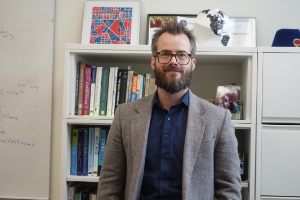Research
Expanding Research in Computer Science

Alex Godwin
Alex Godwin, Assistant Professor of Computer Science, is a new faculty member in the College of Arts & Sciences. Godwin's research is focused on using information visualization and novel interaction techniques to make civic data more accessible. He is excited to be at AU and states, “If you are a student interested in community policies, maps, art, social media, and/or anything to do with touch and pen-based computer interfaces, come and talk to me about some possible options to get a project going!”
We recently interviewed Professor Godwin on his research interests and the projects he plans to pursue at AU. Read below to learn more about Dr. Godwin's research endeavors.
Your interests lie in the visual representation of data through computer interfaces, as well as social computing, art, and serious games. Can you tell us how you became interested in this field?
Computer science gives us many tools to solve hard problems. For many problems, applying the right software technique or utilizing the most recent advances in hardware can get us most of the way to a solution. But we still need a person to set up the system, guide the analysis process, and interpret the results. That means we have to understand the best techniques for helping that person interact with the system and comprehend the data. The human visual system can process an enormous amount of data and perceive patterns that are still challenging to get a computer to recognize. I also like that data visualization combines aspects of psychology, neuroscience, statistics, color theory, graphic design, and aesthetics all within the same discipline – to get the best results, we have to know almost as much about people as we do computers.
What research projects do you hope to pursue at AU?
At AU I plan to continue my research into designing techniques for representing and interacting with civic data. For several years I’ve been working with non-profits, city government, and NGOs in Atlanta to help them find ways to utilize the data they’ve been able to collect. Now that I’m in the DC area, I’ll be partnering with similar local organizations. I’m emboldened by the passionate students that I’ve been working with so far this semester, and I’m looking forward to putting them to work on projects that are technically challenging but have societal impact. More specifically, I have projects in the early stages for analyzing data in public safety and public health.
What would be the larger significance (whether theoretical or societal) of this research?
Visualization and civic data science can have a transformative effect on communities, either in helping to shape policy or to lend authority to issues the community has been dealing with for many years. I like to think that by partnering with communities, we draw ourselves into larger conversations about the implications of computing technology that are harder to anticipate if you are only designing software for the app marketplace. I have found it encouraging that in many conversations with students and other faculty at American University, there has been an enthusiastic response to collaborating on civic data visualization research, and I’m looking forward to seeing what the students come up with in the years to come.
What’s the number one most exciting thing that has happened with your research at AU or previous institutions, whether in terms of findings or recognition?
Several years ago, I was helping to mentor students who were working with the Westside Communities Alliance at Georgia Tech to design a public safety dashboard. This dashboard was designed and developed in partnership with community leaders in the Westside neighborhood to help provide transparency of crime and vacant housing data for its citizens. One of the key findings of our discussions with the community leadership was that if we only mapped the negative aspects of public safety we would be encouraging the deficit-based perception of the neighborhood as one containing only bad things. We also had to incorporate the assets – the churches, schools, elderly care centers, and other key community locations that the neighborhood values. It seems so obvious, but it was something we just had not considered when thinking about the problem initially only through the lens of software engineering – the partnership was key. This finding deeply influenced me as a researcher, but I have found out through the paper we published other researchers in my community have begun to recognize the problems of dashboards that characterize neighborhoods solely through mapping crime.

